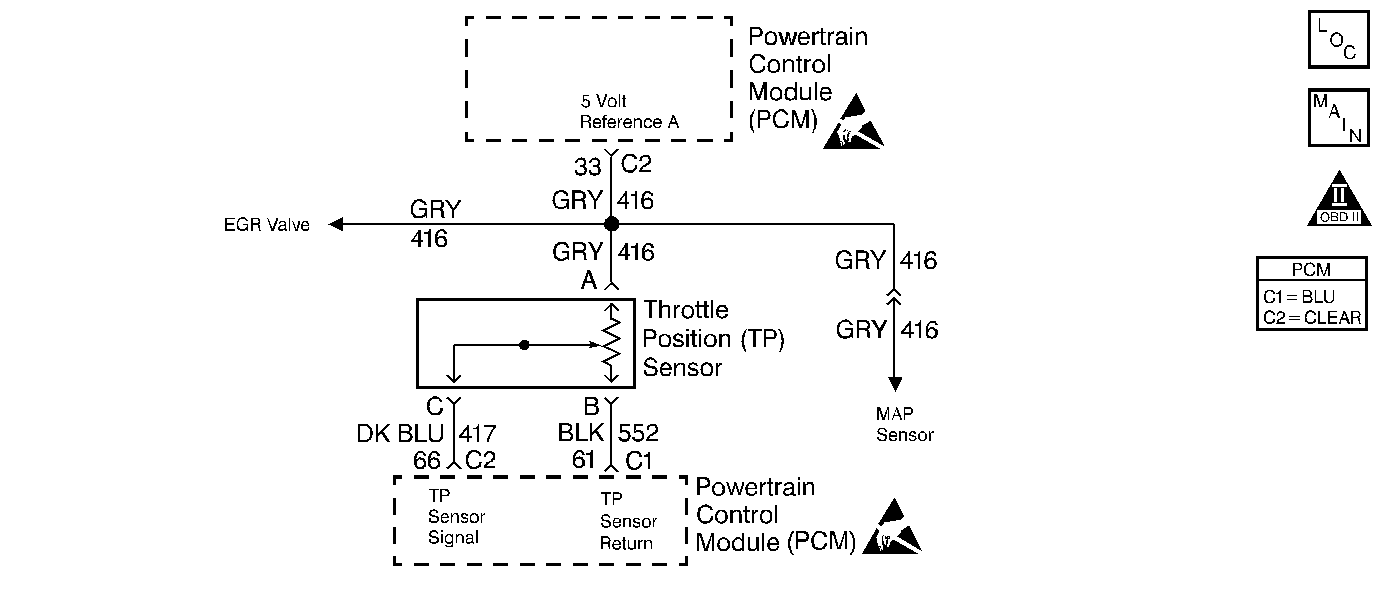
Circuit Description
The Throttle Position (TP) sensor circuit provides a voltage signal that changes relative to throttle blade angle. The signal voltage will vary from 1.0 volt at closed throttle to 4.0 volts at Wide Open Throttle (WOT).
The TP signal is one of the most important inputs used by the PCM for fuel control and most of the PCM-controlled outputs. If the PCM detects a TP signal that is intermittently above the range of the TP sensor, DTC P1121 will be set.
Conditions for Setting the DTC
| • | The ignition is ON. |
| • | TP sensor indicates a throttle position voltage intermittently greater than 4.7 volts. |
| • | Above conditions are present for longer than 10 seconds. |
Action Taken When the DTC Sets
| • | The PCM will not illuminate the malfunction indicator lamp (MIL). |
| • | The PCM will store conditions which were present when the DTC set as Failure Records data only. This information will not be stored as Freeze Frame data. |
Conditions for Clearing the MIL/DTC
| • | A History DTC will clear after 40 consecutive warm-up cycles have occurred without a malfunction. |
| • | The DTC can be cleared by using the scan tool Clear Info function. |
Diagnostic Aids
Check for the following conditions:
| • | Poor connection at PCM. Inspect harness connectors for backed out terminals, improper mating, broken locks, improperly formed or damaged terminals, and poor terminal to wire connection. |
| • | Damaged harness. Inspect the wiring harness for damage. If the harness appears to be OK, observe the throttle position display on the scan tool while moving connectors and wiring harnesses related to the TP sensor. A change in the display will indicate the location of the fault. |
If DTC P1121 cannot be duplicated, reviewing the Fail Records vehicle mileage since the diagnostic test last failed may help determine how often the condition that caused the DTC to be set occurs. This may assist in diagnosing the condition.
Step | Action | Value(s) | Yes | No | ||||||
|---|---|---|---|---|---|---|---|---|---|---|
1 | Was the Powertrain OBD System Check? | -- | ||||||||
2 | Select DTC info, Last Test Fail and note any other DTCs set. Is DTC P0123 also set? | -- | Go to DTC P0123 Throttle Position (TP) Sensor Circuit High Voltage | |||||||
3 | Is DTC P1111, P1115, and/or P1106 also set? | -- | ||||||||
4 | Check for a poor sensor ground circuit terminal connection at the TP sensor. Refer to Repair Procedures in Electrical Diagnosis. Was a problem found? | -- | ||||||||
5 | Check the TP signal circuit between the TP sensor connector and the PCM for an intermittent short to voltage. Refer to Wiring Repairs in Wiring Systems. Was a problem found? | -- | ||||||||
6 | Check for an intermittent short to voltage on the 5 Volt Reference A circuit between the PCM and the following components:
Refer to Wiring Repairs in Wiring Systems. Was a problem found? | -- | ||||||||
7 | Check for a poor sensor ground terminal connection at the PCM. Refer to Connector Repairs in Wiring Systems. Was a problem found? | -- | ||||||||
8 | Check for an intermittent open or a faulty splice in the sensor ground circuit. Refer to Wiring Repairs in Wiring Systems. Was a problem found? | -- | Go to Diagnostic Aids | |||||||
9 | Replace the faulty harness connector terminal for sensor ground circuit. Refer to Connector Repairs in Wiring Systems. Is the action complete? | -- | -- | |||||||
10 | Repair intermittent open/short circuit in wiring harness as necessary. Refer to Wiring Repairs in Wiring Systems. Is the action complete? | -- | -- | |||||||
11 |
Does scan tool indicate DTC P1121 failed? | -- | Repair complete |
